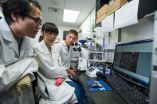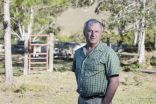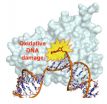Trojan horse tactic gives parasites edge over immune systems
2014-11-25
(Press-News.org) Parasites use Trojan horse subterfuge to suppress the immunity of their victims when causing infection, according to a study.
The finding, which shows a new trick parasites can play, paves the way to possible treatments for infectious diseases and allergies.
Scientists have shown that parasites are able to secrete tiny sealed packages of genetic material into the cells of their victims, in order to suppress the immune response to infection.
The packages, known as vesicles, mimic those that are produced naturally in most organisms to carry out everyday functions such as transporting nutrients and chemical messages to and from cells. The parasite uses vesicles to hide its material inside a seemingly friendly exterior, like a Trojan horse.
The study, carried out on a parasite found in mice, showed that the material in the packages is able to interact with the mouse's own genes. It manipulates the cell's machinery to suppress products linked to immunity, so reducing resistance to infection.
Researchers say the discovery could inform new strategies for treating diseases caused by parasitic worms, which affect hundreds of millions of people and animals. The findings also offer a possible way to treat allergies, such as hayfever, because the immune mechanism that parasites block is also linked to allergic reactions.
The genetic material from the parasites can also be detected in human blood, suggesting that this could be used as a test to detect infection in people.
Ongoing studies are looking into whether other parasites and viruses use this same strategy. The study, published in Nature Communications, was funded by the Wellcome Trust.
Dr Amy Buck, of the University of Edinburgh's School of Biological Sciences, who led the study, said: "We can see for the first time that parasites can use packages to sneak their material into the cells of other organisms. We now can develop ways to target this with implications for the billions of people and animals at risk of infectious diseases and allergy."
INFORMATION:
ELSE PRESS RELEASES FROM THIS DATE:
2014-11-25
(Boston)-- In the largest study of the genetics of memory ever undertaken, an international researcher team including scientists from Boston University School of Medicine (BUSM), have discovered two common genetic variants that are believed to be associated with memory performance. The findings, which appear in the journal Biological Psychiatry, are a significant step towards better understanding how memory loss is inherited.
Longer life spans and the increased prevalence of memory impairment and dementia world-wide underscore the critical public health importance of ...
2014-11-25
BUFFALO, N.Y. - A new hybrid vehicle is under development.
Its performance isn't measured by the distance it travels, but rather the delivery of its cargo: vaccines that contain genetically engineered DNA to fight HIV, cancer, influenza and other maladies.
Described recently in the Proceedings of the National Academy of Sciences, the technology is a biomedical advancement that could help unleash the potential of DNA vaccines, which despite two decades of research, have yet to make a significant impact in the treatment of major illnesses.
"The technology that we're developing ...
2014-11-25
There has been much recent debate on the benefits and risks of screening for breast cancer using BRCA1 and BRCA2 mutations in the general adult population. With an estimated 235,000 new breast cancer diagnoses each year in the U.S. and more than 40,000 deaths, it is clearly important to be able to determine which women may be genetically predisposed to breast cancer.
Glenn E. Palomaki, PhD, associate director of the Division of Medical Screening and Special Testing in the Department of Pathology and Laboratory Medicine at Women & Infants Hospital of Rhode Island has ...
2014-11-25
This news release is available in German.
Wireless data transmission largely takes place via WLAN networks, such as WiFi. However, these networks are currently limited to high frequency ranges at 2 GHz and above and, hence, have a limited range. The authors of the study, Arnd Weber of the Institute for Technology Assessment and Systems Analysis (ITAS) of KIT and Jens Elsner, a former member of the staff of the KIT Communications Engineering Lab, propose to extend the frequencies for free communication to include lower ranges and even increased transmission power. ...
2014-11-25
A higher surge of testosterone in competition, the so-called "winner effect," is not actually related to winning, suggests a new study of intercollegiate cross country runners.
The International Journal of Exercise Science published the research, led by David Edwards, a professor of psychology at Emory University, and his graduate student Kathleen Casto.
"Many people in the scientific literature and in popular culture link testosterone increases to winning," Casto says. "In this study, however, we found an increase in testosterone during a race regardless of the athletes' ...
2014-11-25
Anglers across the nation wondering why luck at their favorite fishing spot seems to have dried up may have a surprising culprit: a mine miles away, even in a different state.
Scientists at Michigan State University (MSU) have taken a first broad look at the impacts of mines across the country- and found that mining can damage fish habitats miles downstream, and even in streams not directly connected to the mines.
The work is published in this week's issue of the journal Ecological Indicators.
"We've been surprised that even a single mine in headwaters might influence ...
2014-11-25
Australian average incomes are falling with the country's population growth "masking underlying economic weakness", according to a QUT economist.
Dr Mark McGovern, a senior lecturer in QUT's Business School, said while it was regularly proclaimed Australia had experienced positive economic growth for more than 20 years, there had been periodic per capita declines, indicating the economy was not as healthy as assumed.
"Looking at national income figures in recent years shows our economy is under stress," Dr McGovern, whose research was recently published in the Economic ...
2014-11-25
Few agribusinesses or governments regulate the types of plants that farmers use in their pastures to feed their livestock, according to an international team of researchers that includes one plant scientist from Virginia Tech.
The problem is most of these so-called pasture plants are invasive weeds.
In a Proceedings of the National Academy of Sciences study this month, the scientists recommended tighter regulations, including a fee for damage to surrounding areas, evaluation of weed risk to the environment, a list of prohibited species based on this risk, and closer ...
2014-11-25
Using a new imaging technique, National Institutes of Health researchers have found that the biological machinery that builds DNA can insert molecules into the DNA strand that are damaged as a result of environmental exposures. These damaged molecules trigger cell death that produces some human diseases, according to the researchers. The work, appearing online Nov. 17 in the journal Nature, provides a possible explanation for how one type of DNA damage may lead to cancer, diabetes, hypertension, cardiovascular and lung disease, and Alzheimer's disease.
Time-lapse crystallography ...
2014-11-25
PHILADELPHIA (Nov. 25, 2014) - As the linked epidemics of obesity and diabetes continue to escalate, a staggering one in five U.S. adults is projected to have diabetes by 2050.
Ground zero for identifying ways to slow and stop that rise is Philadelphia, which has the highest diabetes rate among the nation's largest cities. For public health researchers at Drexel University, it is also a prime location to learn how neighborhood and community-level factors -- not just individual factors like diet, exercise and education-- influence people's risk.
A new Drexel study published ...
LAST 30 PRESS RELEASES:
[Press-News.org] Trojan horse tactic gives parasites edge over immune systems




